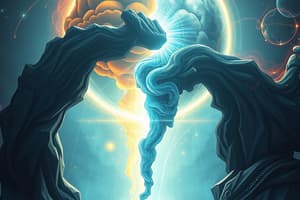Podcast
Questions and Answers
Who is the father of modern philosophy?
Who is the father of modern philosophy?
Rene Descartes
What are the latin phrase for "I think therefore I am"?
What are the latin phrase for "I think therefore I am"?
Cogito ergo sum
What are the essence of human self for descartes?
What are the essence of human self for descartes?
self-a thinking entity that doubts, understands, analyzes, questions, and reasons.
What are the two dimensions of the human self? and what do they mean?
What are the two dimensions of the human self? and what do they mean?
According tp John Locke, the human mind at birth is tabula rasa. Tabula rasa means?
According tp John Locke, the human mind at birth is tabula rasa. Tabula rasa means?
Using the power of reason and introspection enables one to understand and achieve accurate conclusions about the self (or personal identity).
Using the power of reason and introspection enables one to understand and achieve accurate conclusions about the self (or personal identity).
What does St. AUgustine do?
What does St. AUgustine do?
He believes that the body is united with the soul, so that man may be entire and complete.
He believes that the body is united with the soul, so that man may be entire and complete.
What does this book says? Confessions, Augustine
What does this book says? Confessions, Augustine
“I am doubting, therefore I am”
“I am doubting, therefore I am”
Flashcards are hidden until you start studying
Study Notes
René Descartes: I Think Therefore I Am
- French philosopher recognized as the father of modern philosophy.
- Key phrase "Cogito ergo sum" translates to "I think therefore I am," embodying the concept of self.
- The act of thinking about oneself confirms the existence of the self.
- Descartes defines the human self as a thinking entity capable of doubt, understanding, analysis, questioning, and reasoning.
- Distinguishes between two dimensions: the self as a thinking entity (soul) and the self as a physical body.
- Descartes views the thinking self (soul) as non-material, immortal, and independent of physical laws.
- The physical body is seen as a mortal, non-thinking entity governed by natural laws.
- Asserts the independence of the soul and body, indicating they can exist and function separately.
John Locke: The Self is Consciousness
- English philosopher who posits that the human mind starts as a "tabula rasa" or blank slate at birth.
- Asserts that personal identity is shaped primarily by sense experiences throughout life.
- Emphasizes that the essence of the self lies in conscious awareness as a thinking, reasoning, and reflecting identity.
- Believes that consciousness ensures continuity of self-identity across different contexts.
- Advocates for the use of reason and introspection to gain accurate understanding of personal identity.
Studying That Suits You
Use AI to generate personalized quizzes and flashcards to suit your learning preferences.




